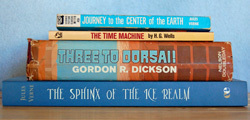Read This! Or This? Or, Maybe, This?
At a meeting last week, an older (but still very active) writer of SF told how he had been asked by someone who had never read SF where she should start.
Eyes shining, this gentleman said his reply was something along these lines. “I said I wished I could be where she was, starting all over again. Then I mentioned H.G. Wells and Jules Verne…”

What to Suggest?
On some level I couldn’t place at the time, this answer bothered me. It wasn’t until a couple of days later that why I was bothered crystalized. I’d finished my current read (Dorsai by Gordon R. Dickson) and, when looking at my “to be read” shelf, I realized that I hadn’t finished the new translation of Jules Verne’s Sphinx of the Ice Realm.
My not finishing had nothing to do with the novel as such, but rather with the volume’s format. In order to pack a considerable amount of material into a 413-page trade paperback –in addition to Verne’s novel, the volume also includes a fascinating introduction, annotations, and the complete text of Edgar Allan Poe’s The Narrative of Arthur Gordon Pym (which inspired Verne’s Sphinx) – the publisher used very tiny print. This challenged my eyes – especially at the end of the day, which is when I usually have time to read.
As I skimmed the opening, trying to decide whether Sphinx would be my next read, I found myself remembering what had been said at the meeting. Would I recommend Verne and Wells to a new reader of SF? My gut feeling was “absolutely not.” Both writers were born in the 1800’s: Verne in 1828, Wells in 1866. While both were quite creative for their time, much of what they wrote about has become part of the “furniture” of the field: time travel, invisibility, moon shots, mutants.
Moreover, their technology and science is distinctly dated. When Verne wrote about Captain Nemo and the Nautilus, the submarine and its capacities were purest SF. Today, submarines are reality. Another example… Frederick Paul Walter explains in his notes to From the Earth to the Moon, Verne’s original story in its full text (often abridged by English translators) contains formulas that were solidly based on the science of the time. These days, even with the formulas, the story is more likely to generate derision.
The issues the authors wrote about reflected the political and social agendas of their day. For a modern reader, unfamiliar with those issues, character motivations are less comprehensible.
Verne offers a special problem in that his works in English were not well served by their translators. Books were frequently abridged to the point of incomprehensibility. Therefore, a new reader of SF who picks up an inexpensive reprint of a translation now in the public domain is quite likely to be confused.
None of this is likely to inspire the sort of “gee whiz” excitement that gets a new reader hooked on SF.
Moreover—going back to the original question – the person who asked for recommendations was female. While both Verne and Wells have occasional interesting female characters, these are the rarities, not the rule. The majority of their female characters reflect the time period’s values. They’re homemakers, eager to become wives and mothers. For a modern female, accustomed to seeing women depicted on television and in movies as starship captains, warriors, detectives, and pretty much any profession at all, this exclusion could be repellant.
Now that I’d figured out why I was bothered, the next question was how would I answer?
I realized that I wasn’t sure. When I started reading SF, the majority of available books still featured male protagonists, and females in more or less traditional roles. I just finished re-reading three of Gordon R. Dickson’s “Dorsai” novels. Although the author says in his intro that the goal of these books is to speculate as to how humanity might evolve in the future – and although each of these novels is set several centuries in the future – female characters are almost invisible. One spaceship, as I recall, has one female officer and she gets knocked unconscious during a battle. Each book has a female secondary character, but these serve little purpose but to confuse the male character by being so alien, so female.
I’ll admit. This didn’t bother me when I started reading SF. After all, the landscape wasn’t all that different from what I encountered in school, where the majority of the books assigned were by male authors and about male characters. What female characters appeared had few goals beyond getting a good husband. But how would a modern reader – male or female – react?
So I toss the question out to all of you… What books and/or authors would you recommend if asked by someone who wanted to start reading SF? Don’t assume your audience is a kid. Lots of adults, made newly aware of SF by movies and television, are interested in finding out what’s going on between the pages. Would your recommendations change if the person was female? What questions might you ask to help refine your choices? Would you feel comfortable recommending the books that got you started?
I’ll be thinking about this, too. I look forward to comparing notes!





